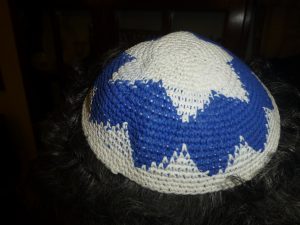
Mohammad Abu Shanab from Gaza recently began making the skullcaps worn by religious Jews as well as Christian clergy, saying, “In the foundation of our religion, we believe in Christianity and Judaism…so we have no problem making the headwear.”
By Reuters and Israel Hayom Staff
It’s not easy doing business from the Gaza Strip, but tailor Mohammad Abu Shanab has found a demand he can supply: His sewing factory is churning out kippot, skullcaps worn by religious Jewish men.

Demand for religious skullcaps is on the rise, Mohammad Abu Shanab says. [Illustrative] – Photo: IsraelandStuff/PP
Since Israel resumed importing clothing from Gaza in 2015, Abu Shanab has renewed commercial contacts to sell merchandise to neighboring Israel. With salaries in Gaza much lower, Abu Shanab’s costs are very competitive.
“We make all kinds of clothes and recently began making the skullcaps that are worn by Israeli rabbis and Christian priests,” Abu Shanab said, adding that the different religions were not an obstacle.
“In the foundation of our religion, we believe in Christianity and Judaism, we believe in the prophets Musa [Moses] and Issa [Jesus], so we have no problem making the headwear, even if they are for Jews or Christians,” he said.
Israel imposes strict export procedures which greatly increase transport costs. Every shipment, no matter how small, must be sent separately.
So far, Abu Shanab has sent 400 kippot and 1,000 bow ties to his Israeli client. Gaza factories also make goods according to design specifications of Israeli companies who send them the fabric.
Abu Shanab said he is also in talks with an Israeli buyer to produce the long coats worn by ultra-Orthodox Jews.
Before Hamas violently seized control of Gaza in 2007, after defeating forces loyal to the party of President Mahmoud Abbas, the territory’s sewing sector was one the largest employers, with over 900 factories employing around 40,000 people.
View original Israel Hayom Publication at:
http://www.israelhayom.com/site/newsletter_article.php?id=41081






 Israeli New Shekel Exchange Rate
Israeli New Shekel Exchange Rate